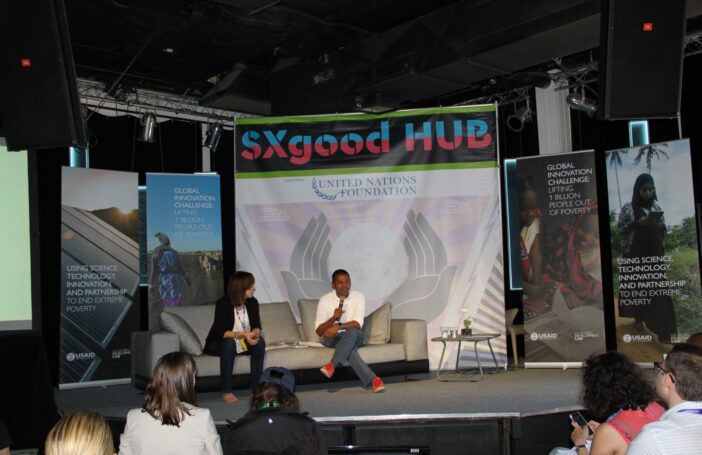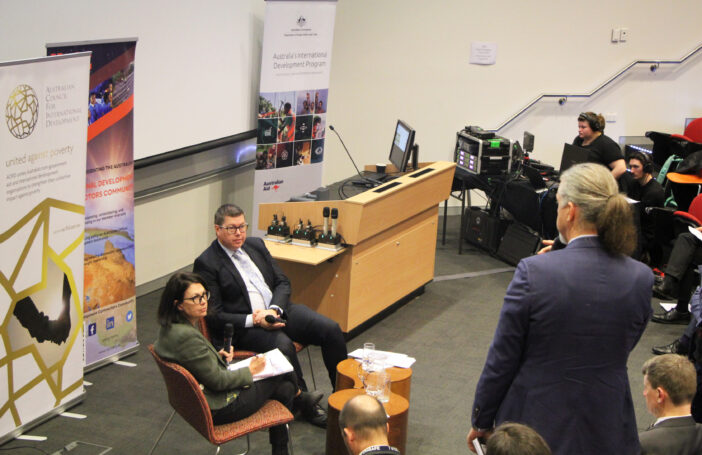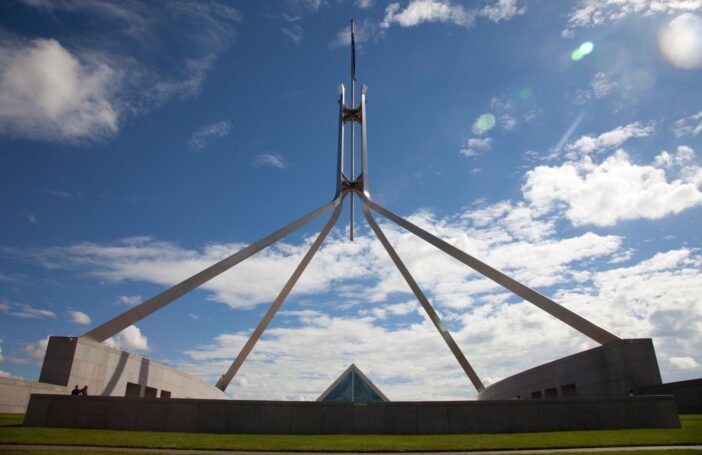Devpolicy’s Associate Director Robin Davies provides this month’s reflections on our April blog posts.
Complicated engagements
Bilateral aid agencies used to talk a lot about the importance of coordination, both with each other and with other parties involved in providing development assistance. This was a matter of avoiding gaps and overlaps, and was achieved, at least in principle, through consultation processes of variable intensity. Now, most often, the talk is of partnership—that is, mingling resources within integrated interventions. Effective partnerships promise to deliver the benefits of coordination, and more besides. In principle, they should be able to reduce transaction costs for the recipient government, combine areas of comparative advantage, help partners learn from each other’s experiences and practices, and more generally cement relationships, perhaps for broader diplomatic or constituency-building purposes. However, partnerships are demanding and, in pursuing multiple goals, run the risk of achieving none.
Foreign Minister Bob Carr and the Chinese Minister of Commerce signed the Australia–China Development Cooperation Partnership Memorandum of Understanding on 9 April in Beijing. This will see Australia and China work together on “regional health issues … and water resources management”. The first joint activity under the partnership will be a “pilot investigation into drug resistant malaria in Papua New Guinea”. Symbolically, this is clearly significant—the Lowy Institute’s Philippa Brant calls it a “big deal” for AusAID, and sees it as a very good thing. China has only signed one other agreement of this kind, and is not generally marked high for teamwork within the donor community.
Sam Byfield, in this post, gives a thorough account of all the usual reservations about China as a donor but, in the end, is inclined to share Brant’s assessment: “Broadly, the MOU should be seen as a positive development.” Reflecting on his own experience, he says that China can be far more flexible and less condescending than traditional donors, and is valued for this. He sees opportunities for two-way learning and hopes the partnership will help draw China into the Cairns Compact, which it declined to join in 2009. He also sees it as a positive development in the bilateral relationship between the two countries, with the potential to balance irritants in other areas, such as marines in Darwin.
It is certainly hard to object to the formation of the partnership, and the first joint activity is an interesting, worthwhile and far from easy choice. At the same time, we should not expect too much. Sam’s post, and this recent Guardian piece, give enough reasons to doubt that there will be a perfect alignment of interests, policies and processes, or a free flow of information, between the parties. In addition, we know from its Donor Engagement Strategy 2012-16 [pdf] that AusAID is already managing formal development cooperation partnerships with nine OECD donors, as well as “trilateral” cooperation arrangements with another half-dozen emerging donors. Moving forward on all those fronts is a fiddly, migraine-inducing business, and the temptation will always be to gravitate toward the cosmetic, rather than undertake the spadework required truly to unlock the non-diplomatic benefits of such partnerships.
When development agencies aren’t forming engagements with each other, they are increasingly wooing business. AusAID, like a number of other donor agencies, now has a formal commitment to increase its engagement with business, with a view to increasing the latter’s engagement in development. Margaret Callan and I have just released a Development Policy Centre Discussion Paper on this topic—public-private partnerships for development—which we summarise in this post. Our central topic is this practical question: how can donor agency resources, whether cash or in-kind, most effectively be used to increase the development impact of business activity?
We argue that, despite the tremendous amount of noise about harnessing the power of business, or leveraging private resources, to achieve development outcomes, there isn’t a lot of careful thinking around on just why and how development agencies should form partnerships with business. Nor is there much information about how existing partnerships are constructed and implemented, or on what impact they have had. These deficits, we say, create a void that tends to be filled by speculation and suspicion. Our piece, and the underlying discussion paper, is an attempt to inject into that same void some information and analysis, based in part on consideration of case studies presented at this 2012 Development Policy Centre forum. We come out broadly positive, but point to many uncertainties and questions that call for further work—some of which we intend to do.
We know both the major parties want to do more to promote public-private partnerships for development. We say, “That’s a good thing, provided the emphasis is on practical engagement that uses, or seeks to generate, evidence on what works—and provided partnerships are squarely about development, not business.” We also note that, without the allocation of dedicated resources, “dialogue will be both the beginning and end of public-private partnerships for development”.
Nous versus cash
If the big emerging donors increasingly look like partners in aid delivery, how should we view the other countries in the burgeoning ranks of the middle-income countries? Many of these countries are experiencing rapid economic growth, accompanied by increased domestic resource mobilisation. At the same time, middle-income countries are currently home to around 70 per cent of the world’s extreme poor, and in many cases exhibit very high levels of inequality. As a general rule, should these countries be receiving less aid, or a different type of aid, or both?
Joel Negin explores the above question in this post, which expands upon and also transplants to Asia some thoughts in this earlier World Bank blog post by Wolfgang Fengler. Aid is rapidly dwindling as a proportion of many countries’ national incomes, so cannot in those countries be filling a financing gap. What such countries face instead, as their economic, social and political institutions evolve to meet the increasing demands of their citizens, is a knowledge gap. Taking this fact seriously, Joel argues, could have “profound implications for … AusAID, NGOs, universities and everyone else involved in development”. Transferring knowledge, he says, requires “open exchanges of ideas rather than top-down dogmatic imposition. It requires greater humility, honesty and … facilitation rather than just technical smarts”.
However, Joel issues three cautions. First, much aid, possibly a majority of it, will still be needed as multi-purpose financing in fragile and conflict-affected states. Second, effective knowledge-sharing doesn’t necessarily come cheap, so one shouldn’t seize on his thesis to support a case for reduced aid budgets. And third, it’s not a given that Australia actually has the knowledge that middle-income countries need or want. Maybe it’s Brazil, South Africa or Mexico that have the goods.
There’s certainly much that Australia’s public policy community can contribute to the further development of middle-income countries in our region, but past experience has shown that we have a lot to learn about how to package that contribution, where to target it, and how to achieve and demonstrate impact. Joel and Wolfgang’s logic also raises some thorny questions about why we do not continue to provide certain forms of targeted aid to countries like China and India, which undeniably have knowledge or capacity deficits in areas such as social protection, and why we don’t allocate more aid to the development and transfer of knowledge as a global or regional public good—that is, knowledge whose benefits transcend borders.
Patronage
Closer to home, it seems cash hasn’t yet gone out of style. The governments of both Papua New Guinea and Solomon Islands have now both greatly increased the amount of funding that is under the direct control of members of parliament, ostensibly for local development spending.
In this post, Colin Wiltshire gives a clear and full explanation of how the system of “devolved” funding actually works in Papua New Guinea. As he makes clear, the complexity of the system doesn’t ultimately hide the fact that most of the devolved funds end up being in the gift of members of parliament, for spending on projects at the provincial, district or local level: “Each MP will become a donor in their district or province with K10 million or more at the disposal of a Committee which they either chair or are a member of.” While some support this funding of MPs as a way to get funds to rural areas, Colin points out the impact of past district development spending is either undocumented or dismal, that allegations of misappropriation are widespread and that service delivery personnel in line agencies inevitably face pressure to allocate their time to development projects at the expense of ongoing programs financed from inadequate recurrent budgets.
Moving east, Tony Hughes decries the replication of the Papua New Guinea devolved-funding model in Solomon Islands. In the face of an unprecedented public outcry, the government is putting in place legislation that will formalise a system of well-endowed “constituency development funds”, thereby giving “statutory endorsement to a system of publicly-funded political patronage, in which MPs try to entrench themselves in power by buying votes and rewarding supporters”. Ashley Wickham, policy adviser to the leader of the opposition in Solomon Islands, makes similar points in this post, in order to highlight what he describes as an “atomistic” approach to development in which the government abrogates core functions to donors, makes no attempt to acquire legitimacy for its national development strategy, and invests the largest portion of its recent effort in “delivering the pork locally”—with the consequence that people have few expectations of their national service delivery agencies.
Ashley’s post concludes by saying, “It’s about time that donors and development partners start using their considerable leverage to change the mindset in government.” There’s no obvious answer to the “how” question here, but his point resonates in relation to both Papua New Guinea and Solomon Islands. Donors’ efforts to strengthen national health and education systems, and the public sector generally, will be continually undermined if they cannot progressively achieve some greater purchase on the way community-driven development is done, and ultimately help depoliticise it. Marcus Pelto, in this post, offers one interesting thought here: once MPs find themselves handling more money than they can spend or explain away, perhaps they might turn for help to an “independent service delivery agency” à la Paul Collier, were there such a thing.
Summary of posts
You can find a summary of all April posts in the list below. As we transition to a new blog format we have stopped most of our buzzes, but you can still catch our fortnightly wraps on the Pacific.
Aid
Enhancing aid cooperation – the Australia-China Development Cooperation Memorandum of Understanding by Sam Byfield.
“Broadly, the MOU should be seen as a positive development. It provides opportunities for China to learn from what Australia has learned in decades of aid delivery in a genuine spirit of dialogue and collaboration.”
Aid for trade: aiding trade or trading aid – either way not much of a deal by Bob Warner.
“…in practice, much of the effort devoted to aid-for-trade has been irrelevant at best, and very often harmful.”
The future of aid: not all about the money? By Joel Negin.
“If knowledge is the new aid resource, the impending question for the Australia is: will anyone value Australia’s knowledge?”
Global development policy
There’s smoke, but is there fire?—Pondering public-private partnerships for development by Robin Davies and Margaret Callan.
“…aid program engagement with business will require dedicated resources and cannot realistically be managed by over-stretched people working on country programs that are subject to a host of existing policy imperatives.”
Careers in development: an interview with Susan Harris Rimmer on a career spanning the private sector, public sector, NGOs, and academia by Susan Harris Rimmer.
“… you will never get work in an NGO unless you have some basic [volunteer] field experience.”
Myanmar: on the move by Anthony Swan.
“The task ahead for the country is daunting yet the government has surprised many by containing inflation from levels over 30% in recent years, reforming its notorious multiple exchange rate system… and passing legislation to allow 100% ownership of domestic companies by foreign investors.”
A once-in-a-generation opportunity: the final push to end polio by Bruce Aylward.
“For this last endeavor to succeed, US$ 5.5 billion is required between 2013-2018. The benefits of this investment in a polio-free world are estimated to be savings of $40-50 billion by the year 2035, with about 85% of the savings accruing to low income countries.”
Avoiding four degrees by Ashlee Betteridge.
“[Quoting Rachel Kyte, World Bank Vice President for Sustainable Development] ‘Climate change is the rug that is being pulled out from underneath the poor today and will be pulled out from underneath all of us, rich or poor, in the next 20-30 years.’”
The Pacific
Would an Independent Service Delivery Authority accelerate service delivery in Solomon Islands? By Marcus Pelto.
“An ISDA would apply great pressure to the current closed shop that is public policy at the national level in SI and, if allowed to flourish, could potentially re-configure the current governance equation.”
Service delivery in Solomon Islands: a good start, but where to from here? By Marcus Pelto.
“In SI the missing link appears to be political accountability. Put simply, MPs are not voted into office based on their record of and plans for broad-based service delivery.”
Speed-dating, solar panels and the importance of process by Joanna Spratt and Terence Wood.
“Speed-dating creates connections, but if the relationship is to last, simply selling the technology and providing the funding is not enough.”
Visible and invisible hands: developing the Solomon Islands economy by Ashley Wickham.
“I believe that SIG is abrogating its responsibilities and sitting back and watching donors (development partners) carry out the necessary investment in development.”
When Monsoon Asia met Melanesia (and Dutch Hollandia became Asian Jayapura) by John Conroy.
“The Indonesian provinces of Papua and West Papua are seen as the historic meeting ground, or zone of transition, between Monsoon Asia and Melanesia.”
Against public objections, Solomons MPs give themselves bigger slush funds by Tony Hughes.
“The CDF Act will give statutory endorsement to a system of publicly-funded political patronage, in which MPs try to entrench themselves in power by buying votes and rewarding supporters.”
In conversation with Sir Mekere Morauta by Tess Newton Cain.
“In response to those who have characterised the Pacific Plan as a failure, Sir Mekere put forward this challenge: ‘I think I’d want people to also talk about why it failed. Just to say failure, is not helpful. I think people who are trained to think should go deeper and point out why it failed, and in what areas should we repair. Because this review is a repairing job, repair the failures of the past to make sure we go into the future.’”
Lifting skills in the Pacific: using infrastructure procurement for skills transfer by Richard Curtain.
“The recent World Development report on Jobs calls for policies which move job creation and skills transfer to centre stage. Donor funded building, communication and renewable energy projects in the Pacific are a good place to start.”
PNG
Leadership for the next generation: Deakin University’s Symposium on PNG by Grant Walton
“…despite some tremendous challenges – as these presentations show, there is still much to be hopeful about in PNG.”
Another Port Moresby community bulldozed by Michelle Nayahamui Rooney.
“With Port Moresby’s rapidly growing population, the high cost of rental accommodation and generally high cost of living, it is likely that, rather than remaining a peripheral part of the socio-landscape, settlement communities will become the norm.”
Reflections on the PNG Budget Forum: Can devolved funding be effectively utilised by Colin Wiltshire.
“…the new changes have put MPs at the centre of decision-making, at the provincial, district and local level. Each MP will become a donor in their district or province with K10 million or more at the disposal of a Committee which they either chair or are a member of.”
Robin Davies is Associate Director of the Development Policy Centre.




